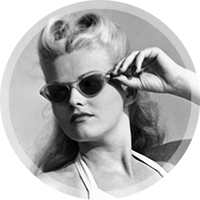

At the start of every new week, I sit down to log my past and make my plans. Not only do I make lists of weekly responsibilities and singular tasks, I keep track of what I have done recently. I record all of of the books, films and audio I have consumed*, and I mark my progress on activities that I’m trying to strengthen into habits. Some weeks these activities boast seven full marks of completion. Sometimes their designated spaces have only a straight line run through, my symbol of absence. I consistently fill in the spaces meant for my daily journal pages. My spaces for my daily non-journal writing, however—those spaces are filled in more sporadically. But I continue to turn a fresh page, and make a new set of spaces, and another goal to write every day. Because I’m determined to make this creative work a natural habit.
The greatest trick the devil ever pulled on those who aspire to creative work is to convince them that it’s not truly work. The myth that creativity is dictated by capricious muses and lightning bolts of inspiration is one of the more damaging assumptions our culture as a whole has bought into. Such thinking establishes a barrier against people who would be creative on a casual, exploratory basis; it demands that people who want to live for their art pay outrageous prices; and it chases away people who don’t have the luxury or luck or both at the right times to be able to get and pursue their creative impulses. The way we’re taught to think about artists is the strongest blockade in the path of making more of them.
For most of my life, I thought as creativity as something mysteriously, divinely ordained, a fundamental force I had no control over. I was to be only a supplicant, waiting for whatever scraps of ideas would be tossed my way by unseen hands. In addition to this, I believed I had only a finite creative capacity to work with, so that whatever innate talents I had been blessed with—or, more to the point, denied—from the beginning would determine what I was able to create throughout my life. This mythology of the artist might well serve for those who are extraordinarily talented or those who are afforded endless amounts of time to wait around for inspiration. But it ill serves anyone else. The reality of human nature and human lives doesn’t work this way, and if it did, it still most likely wouldn’t be a healthy way for humans to live. Which is what convinced me that the myth is just that: a story that does not tell the whole truth.
Here is the truth about being creative: you do not need to do it expertly. You do not have to only succeed in bold, public strokes. You do not have to succeed at it at all. You do not have to meet anyone else’s standards to do it. You do not need anyone’s permission to do it. You do not have to have the best of natural gifts for it. You do not need to have gone to certain schools. You do not need certain materials or certain environments or certain opportunities. You do not have to do any of it perfectly. You just have to do it.
I established this newsletter as a mechanism to encourage more writing. Putting it out into the world every week has made me accountable for producing something, to fulfill my promise, and getting past my own insecurities and doubts and excuses for not producing. But there’s more I want to do. I haven’t got the time or luxury to sit around and wait for a lightning bolt of artistic perfection. I have small bits of time, consistently over the course of one day after another. So that is where I am learning to fit my creativity, to tame the force and control it myself, and bend it towards my own ends. I force myself to sit down and make something, and I take note of my progress, or my lack of it. As long as there is movement forward, as long as there is more there that wasn’t there before, there’s success. And, maybe, that example, in its messy, imperfect, determined striving, is something worth creating in itself.
*I have kept track of the books I read each year for the past three years, and films for the last year, but this year I also keep track of significant television and audio (music and podcasts), a la Steven Soderbergh’s yearly log. At the end of the year, I will similarly make it available on my website.